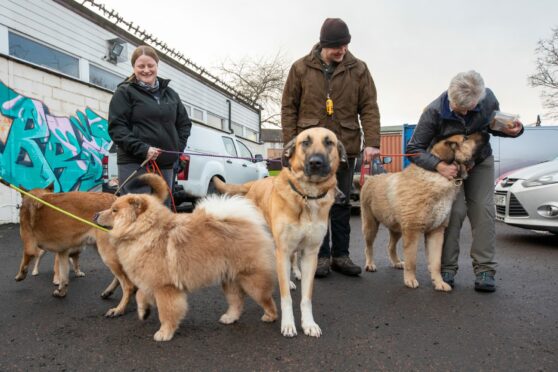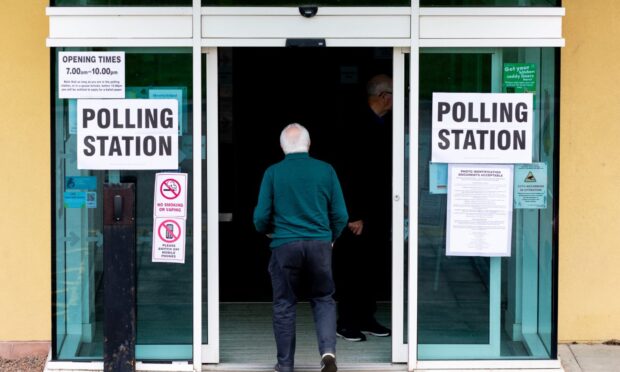What seems like a straight forward campaign to improve animal welfare turned into a heated debate between a local dog trainer and an Angus MP.
The argument was sparked by electric dog collars, or e-collars.
They are devices worn around a dog’s neck like a normal collar, often to train or control a dog.
The collars deliver a static stimulation to the animal via a remote control or through an automatic trigger.
They are legal in Scotland but in 2018 the SNP Government published guidance advising people not to use them.
‘These must be banned’
Dave Doogan, SNP MP for Angus, says he would “never” considered putting one of these collars on his dogs.
He has a 13-year-old golden retriever called Maggie, and says he trained her by rewarding good behaviour with treats and food.
Mr Doogan publicly called for the collars to be banned after attending an event in Westminster by The Kennel Club, who oppose their use.
But in a forthright response, local group Angus Dog Training claimed e-collars have stopped pets from killing sheep “countless times”.
Others on social media claimed the collars transformed their dog’s behaviour.
Mr Doogan said: “My position is informed by the line leading animal charities in Scotland take.
“They are clear – these collars are not suitable and shouldn’t be used.
⚡️ It is beyond my understanding why anyone would electric shock a dog to 'train' them.
🦮 Training takes time, patience and reward for the dog not pain and suffering.
❌ These must be banned. pic.twitter.com/nuV1hjXzli
— Dave Doogan MP (@DaveDooganSNP) November 29, 2022
“Maggie is very easy but she was not always that way.
“But the idea of using one of these devices is not something I would consider.
“I do not advocate for physical punishment for bad behaviour in an animal, but rather rewarding good behaviour.”
He added he does recognise those who are against the call to ban them do have animal welfare in their hearts, but added it is not something he agrees with.
‘It’s a tap, not a shock’
The reaction on local social media groups was strong and led to wider debate.
His Facebook post on the topic gathered hundreds of comments, with many saying they supported e-collars and said he needed to “educate himself” on the matter.
No one wants to inflict pain or punishment on dogs, this is positive reinforcement.”
– Jessica Probst, Angus Dog Training
One responded to say: “It’s a tap not a shock – I tried it on myself first – and without it my JRT would have been shot by our local farmer as he would chase local livestock.
“I only had to use it once, he knew it was on and behaved himself – they are fantastic.”
Another said: “Absolutely the best training tool for dogs that are high prey driven or very stubborn – [it] transformed my dogs life and now he can be off the leash with perfect recall.”
Responding to Mr Doogan’s comments, Jessica Probst, founder of Angus Dog Training, said the collars are “life-savers”.
Ms Probst, who covers livestock avoidance in her dog training, argued they are necessary for certain dogs and for owners who have disabilities.
She said calls for them to be banned are ill-informed.
Ms Probst told The Courier: “Training with e-collars is the only way many dogs can be prevented from killing sheep.
“I have dealt with countless cases where, were it not for e-collars, dogs would have been put down for attacking other animals.”
She argues the collars give a vibration, similar to how a TENS machine is used for pain relief in people, rather than a shock that can cause physical pain.
Ms Probst added: “No one is going around shocking dogs and it makes us upset people think that is what we are doing to dogs.
“No one wants to inflict pain or punishment on dogs, this is positive reinforcement combined with a vibration.”
She claimed Mr Doogan’s position on the matter shows he has “very little understanding” of how the collars work, and has invited him to attend one of her training classes to see how she uses them.
What happens next?
The Scottish Animal Welfare Commission is currently investigating the use of electric dog collars.
A spokesman for the Scottish Government says they expect the results of this investigation next year.
The government will consider any recommendations from the commission.
The spokesman added: “Scotland is a nation of pet lovers and it is vital that those who have pets practice responsible ownership to ensure the highest standards of welfare.”













Conversation